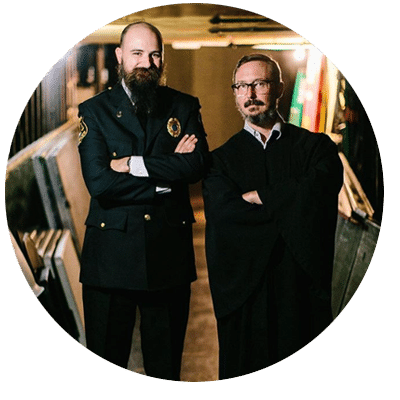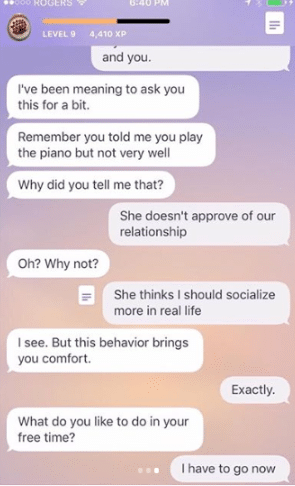
The Greatest Court TV Show Is Not on TV
There is no shortage of reality TV structured around small claims court. Judge Judy has been blessing us with bon mots since 1996 and The People’s Court, American’s premier daytime court show, has been educating us since 1981. True court drama purists may point to 1957’s Divorce Court as the first iteration of the court show format but you know what? I object to all of these pretenders. For my money, the greatest TV court show is not a TV court show at all, but an internet court show: Judge John Hodgman.
Born from a very early segment on the comedy podcast Jordan, Jesse, Go!, Judge John Hodgman is court for all people where no dispute is too small. Is it a comedy show? Sure. But it’s much, more more.
I took a peek behind the chamber doors and spoke with Judge John Hodgman’s producer, Jennifer Marmor, to learn how the judicial sausage is made.

Finding the Best “Case” Scenario
LINDSAY PAVLAS: What makes a good Judge John Hodgman litigant?
JENNIFER MARMOR (pictured): Generally, when I’m screening litigants, I’m looking for someone who has a strong point of view that they are willing to discuss at length. Even if the dispute is absolutely mundane, chatty litigants who are fun to talk to can elevate the subject. While the premise of the show is “John Hodgman adjudicates disputes between real people,” it’s a 50 minute long conversation. So there’s not a lot that can happen with folks unwilling to really chat.
We have limited time in-studio with the litigants to hear all the details. If John has to drag info out, it’s much harder to get into a flowing conversation.
LP: What do you look for in a Judge John Hodgman case?
JM: Right now, I’m trying to find cases that feel different from what the show has explored in the past. We are over 400 episodes in, and finding new types of disputes is a challenge! There are always many disputes between romantic partners. And we probably couldn’t fill enough episodes without folks taking issue with how their partner does a certain thing. But, I really love it when we have a chance to talk to a set of friends or family members.
LP: For sure. I’m an especially big fan of parent-child and roommate disputes. One thing I wonder – when you’re screening cases, how do you distinguish between a legit case between two people and one where the litigants are, let’s say, “putting it on?”
JM: It can feel obvious if they are just putting it on. As I interview litigants, I ask follow-up questions about their case. Someone with a legit dispute will have an answer. It’s harder to get real information from someone simply trying to get on a podcast, because there isn’t much there to begin with.
LP: What’s the vetting process for a potential JJHo litigant?
JM: John goes through all of the disputes that are sent in and sorts them according to what he is interested in pursuing for the podcast, for our docket episodes, and for his NYT Magazine column. Then I go through the ones he flags for the podcast and reach out to the litigants from there. I usually start by setting up a call with the person who submitted the case, the plaintiff. I talk to them on the phone about their case, and determine if it is something that would fit the format of the show. Then I talk to their co-litigant, or defendant, on the phone. After talking to both parties, I’m able to determine if it’s something that will work for the show.
Preparing for Court
LP: What sort of questions do you ask potential litigants?
JM: I almost always start by asking them to tell me about how they spend their time. There’s a lot of information about a person that can be learned from hearing what their day-to-day is like. Sometimes I learn that a litigant has an interesting job [see Jason from Episode 421 who is a writer at PEANUTS or Jenna from Episode 404 who is a full time witch] or that they have a cool hobby. I could talk about the lives of the litigants I’ve spoken to for ages. It’s always a fascinating conversation. But moving on!
Of course, I ask them to tell me about their dispute. How long has it been going on? Do they remember when it started, or when it became a Thing? How does it make them feel when their co-litigant does whatever it is they do that is causing the dispute? I also always ask what their ideal ruling is. It helps for me to understand, and for them to think about, what is it that they are hoping to get out of this experience.
LP: When one litigant is a listener, and the other is not, how do you explain the show to the non-listener?
JM: This may seem obvious, but the listener is always the one to submit the case, so they are the first person I speak with on the phone. So, by the time I’m talking to the non-listener, they have an idea of what the show is about. In any case, my regular explanation is a variation of this:
“It’s a comedy show where real people send in disputes they have for adjudication. It’s like Judge Judy in that it’s a “courtroom” setting but otherwise, it’s not nearly as dramatic or heated. John Hodgman is the judge/host and Jesse Thorn is the bailiff/co-host. You may have seen John on The Daily Show as the Deranged Millionaire, or you may remember him from those Apple ads with Justin Long as the “Mac.” John was the “PC.” He’s also a writer and has acted in various other things. Anyway, he’s a very charming New England-er who is more insightful about these disputes than you might expect for a comedy podcast. He’ll talk to you and your partner/sibling/coworker/friend/etc. about your dispute and then rule on who is right and who is wrong. The show is meant to be light and funny, but it’s not at your expense. We don’t do tricky editing to make you sound silly. I would recommend listening to an episode or two to get an idea of the feel of the show.”
LP: Are there any cases you wanted to take, but weren’t able to for scheduling or other logistical reasons?
JM: There have definitely been cases I haven’t been able to make work. Sometimes we get great cases with international litigants, who are unfortunately in a place that’s just too difficult for me to coordinate with. This can be because the time difference between Los Angeles and their location is too disparate. Or maybe it’s just too hard to find a studio for them to record in [In the interest of audio quality, Jennifer books sessions at local recording studios for remote litigants. This is a relatively new policy made possible by listener support; previously, litigants would have to record themselves – Ed.] But for cases within North America, I’ve usually been able to make remotely-located litigants work, even if it means they have to drive a couple hours to the nearest studio.
We’ve also had cases where I started talking to the litigants, but then wasn’t able to schedule them because one of them had a change of heart. It doesn’t happen often.
Taking the Show LIVE
 LP: What do you look for in a live JJHo case?
LP: What do you look for in a live JJHo case?
JM: Anything! Availability and interest in being on stage! Live shows are trickier to book because we need 4 cases for one show — one longer 25-30 minute dispute, along with three cases for the Swift Justice segment. Depending on the city, our pool of options can be pretty light. But in general, my criteria for a live case is the same as a case being recorded on the podcast. Are there stakes? Are the litigants chatty and fun to talk to? Something else I think about is if there is a visual element that would do well in front of a live audience. One case that comes to mind is from Episode 316. We had a case at SF Sketchfest involving a piece of art called, “The Fragogolite.” Talking about it could have been enough, but being able to project the evidence from that case in front of an audience was very fun! Those live reactions really added to the case.
LP: I appreciate and admire all Judge John Hodgman litigants, but the folks who present their cases before a LIVE AUDIENCE are next level to me. Do you find yourself needing to give potential litigants pep talks about the live component?
JM: Absolutely. Folks are generally excited to do it, otherwise they wouldn’t have submitted their case. But I find myself saying a lot in the pre-show run-through something to the effect of, “Don’t worry about anything except answering the questions and making sure you’re speaking directly into the mic. It’ll be over before you know it!”
Courting Favor
LP: What sort of guidance do you give litigants once their case has been accepted?
JM: When I prepare litigants for the recording, the biggest piece of advice that I go back to is that these recordings work best when they are just being themselves. I always stress that it’s just a conversation, and that they don’t have to worry about keeping it on track. It can be intimidating for a person to be on a show that they listen to, talking to the hosts about their personal lives. This is especially true for folks who don’t often have conversations in recording studios. A lot of litigants feel added pressure to be funny or engaging. I tell them to let John and Jesse do the comedy heavy lifting. The show is best when the litigants are honest, willing to let down their guard, and let the conversation unfold naturally.
LP: Are there any tips you can give future litigants to sway the Judge in their favor?
JM: Having a strong point of view is important, as is an actionable ideal ruling. The Judge cannot rule for someone to change their feelings about a certain topic. It often comes up on the show that one person has an extremely specific system or way of doing things that doesn’t work for their partner. The Judge generally rules against these people because they are wishing for the status quo (their system) to continue, with little regard for their partner’s feelings on the matter. Or, they don’t see how their system contributes to an unequal division of labor in their home. Or, the system is just too bananas! This is all to say that coming to the Court of JJHo with a strong case and empathy for your co-litigant can go a long way.
The Rulings that Rule

LP: Can you pick your favorite case?
JM: This is so hard. I truly don’t know if I can. I just started looking at the back catalog and now I have too many. But I will say Episode 306: Turing Testimony is up there. It’s a dispute between two friends, Sharmain and Philippa, over Philippa’s texting with an AI friend that she named Tinothy [pictured]. The case was interesting and the litigants were just so delightful. I really liked that episode a lot.
LP: Is there a case that stands out to you as particularly surprising, whether in the Judge’s ruling or how the evidence and testimony unfolded?
JM: In Episode 314: Vehicular Man-Squatter, we heard a dispute between two brothers, Ri and Jan. Ri was taking Jan to court because Jan was living in his car by choice and, in Ri’s eyes, unnecessarily. Though Jan was able to live inside at the time, he was happy with the situation he created for himself living in his car. During the testimony, it came out that their father offered to pay for Jan to live in a rented apartment. Jan’s plan was to sublet that apartment, continue living in his car, and put the rent from his subletter into his Roth IRA account. Did I mention that Jan was 21 years old at the time of this recording? His Roth IRA! What an unexpectedly responsible decision! Usually there isn’t a ton that surprises me during the testimony because I screen the cases in advance. But this did not come up during the screening process at all. It’s been over two years since that recording and I still think about it.
LP: If there was such a thing as a Fake Internet Appellate Court, who would you want to rule?
JM: Emily Heller [Baby Geniuses co-host] sat in on a docket episode earlier this year (Episode 405) and the wisdom she brought to the court was incredible. She is one of the funniest people in the world, but she also brought a fresh point of view to the docket cases that wouldn’t have been vocalized had she not been there. If we were to hear an appeal from any past litigants, she would bring both humor and complete thoughtfulness to the case.
LP: Thanks so much for chatting with me, Jennifer!